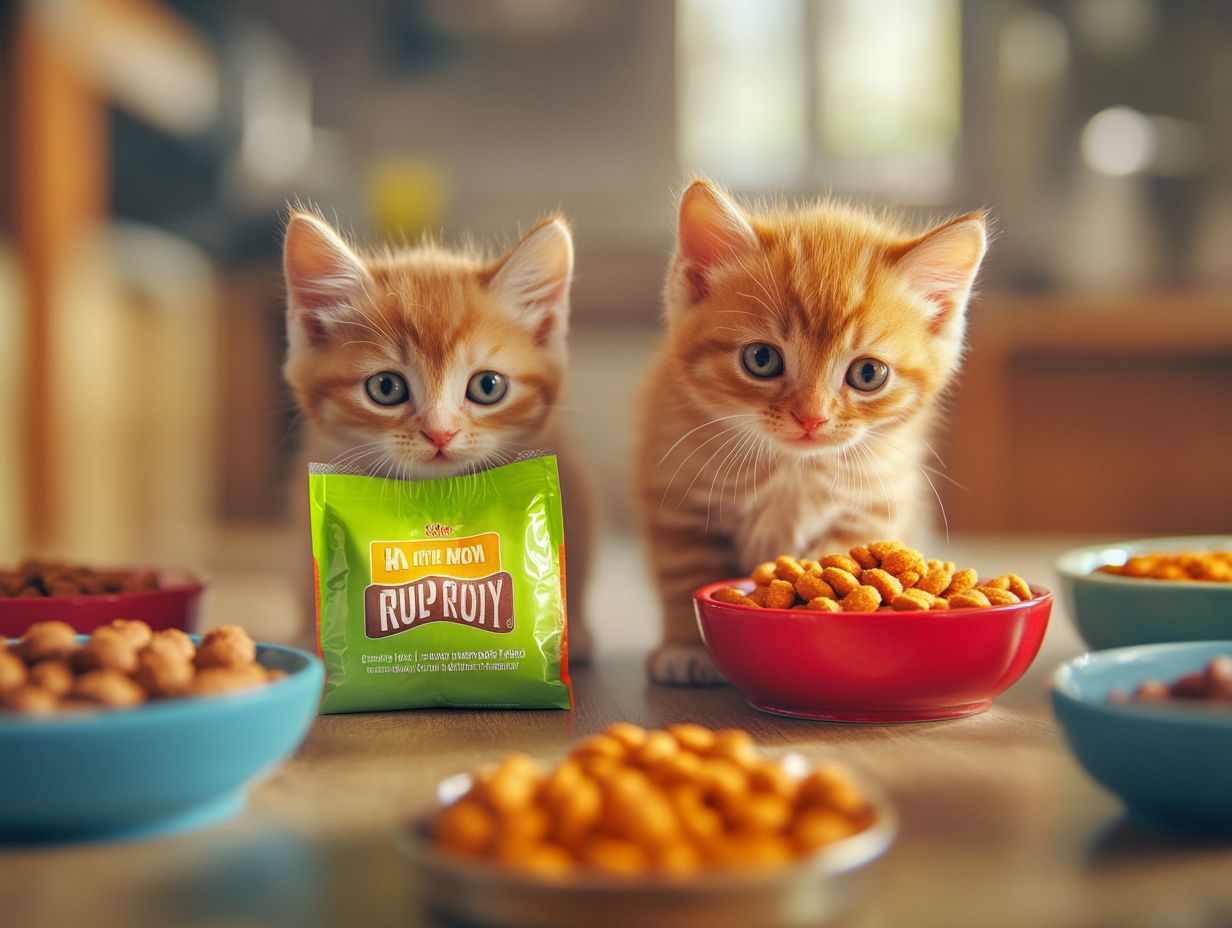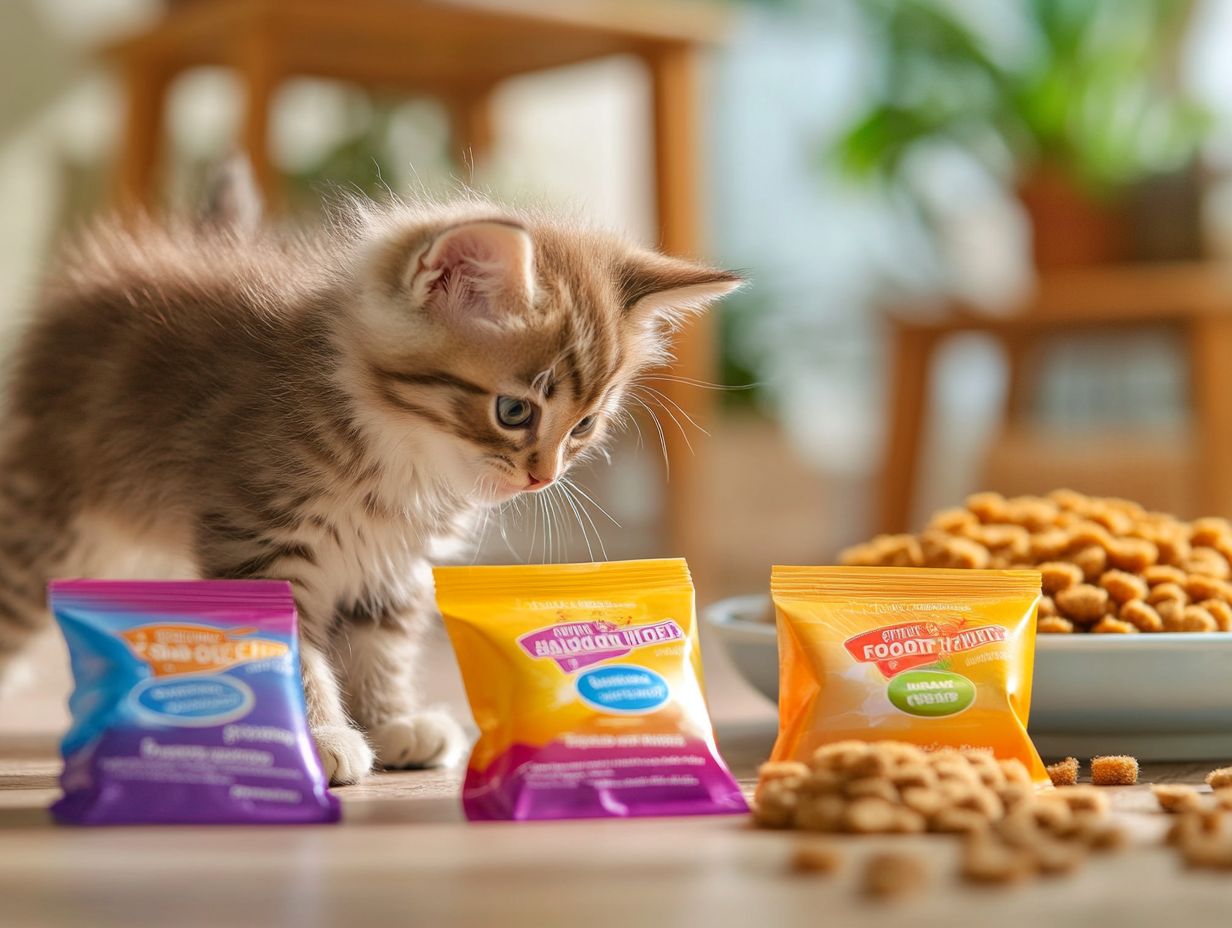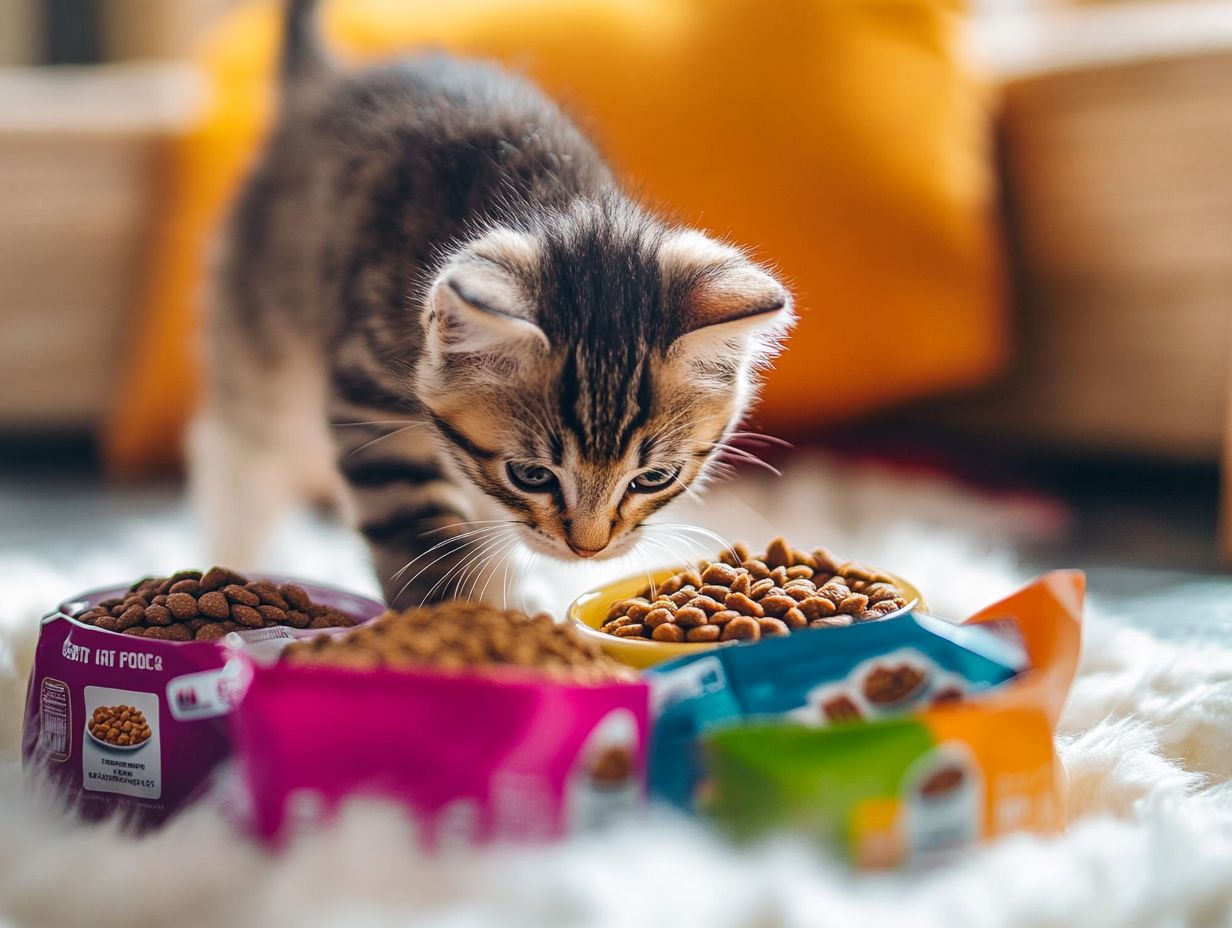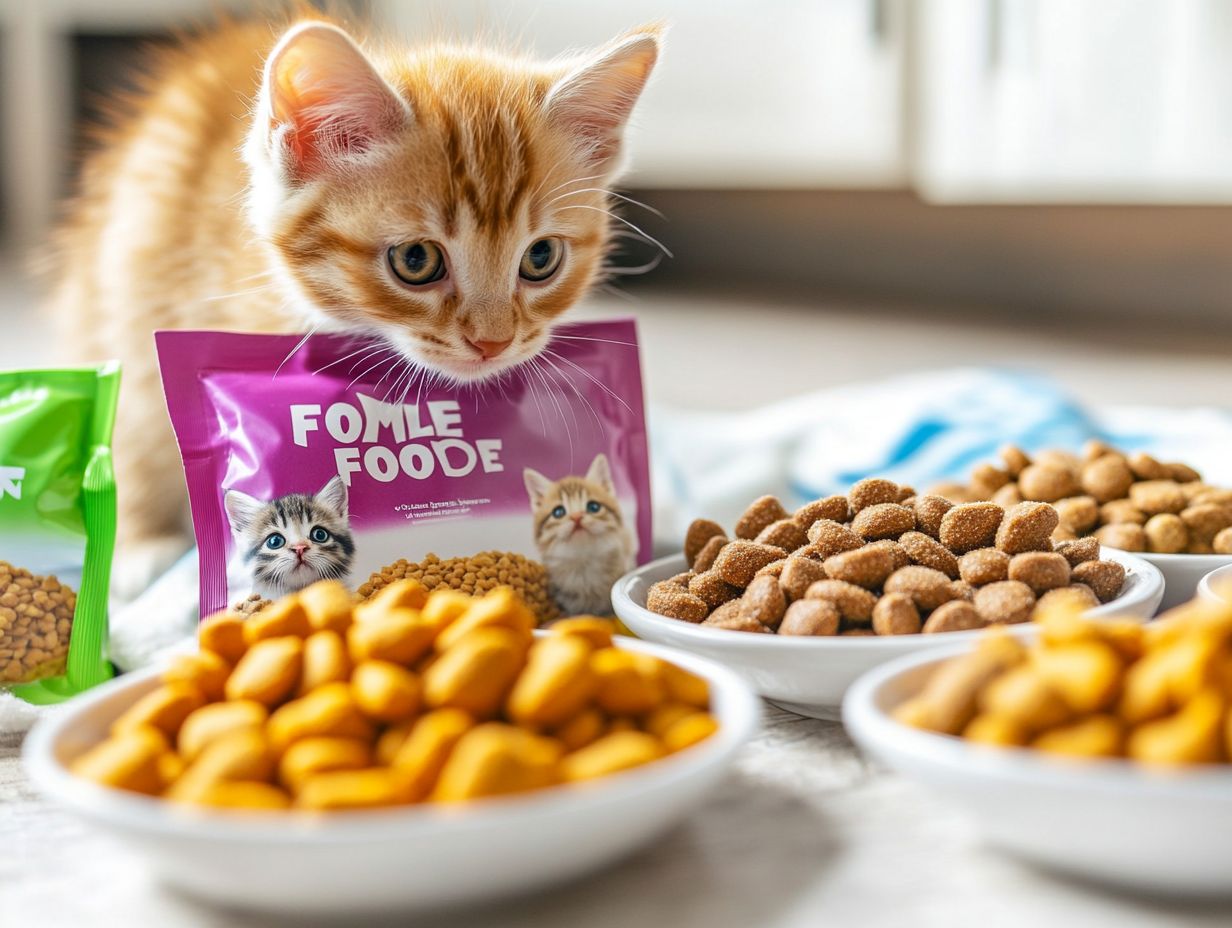Choosing the right kitten food is crucial for their growth and overall health, with a focus on high-protein options derived from animal sources that cater to their obligate carnivore nature.
Packed with essential nutrients, protein-packed options support strong muscles, healthy bones, and vibrant energy levels.
This article explores the importance of protein, how much your growing feline needs, the best kitten food options, and what to look for in high-protein choices.
It also discusses transitioning your kitten to these foods, considering their digestive needs, and the potential risks involved.
Providing a well-balanced diet is essential for the healthy development of your kitten.
Key Takeaways:

What is High-Protein Kitten Food?
High-protein kitten food is crucial for the healthy development of young felines, providing the essential nutrients and energy needed during their growth phase. This type of food is formulated with high-quality ingredients, including DHA sources and omega-3 fatty acids, rich in protein and essential amino acids, ensuring that kittens receive optimal nutrition for their rapid growth.
Many brands, including Wellness CORE, Open Farm, and Smalls Ground Other Bird Fresh Cat Food, offer tailored formulations that meet the natural dietary needs of kittens, promoting overall health and vitality.
Why is Protein Important for Kittens?
Protein is essential for kittens as it supplies the vital amino acids necessary for their growth, muscle development, and overall health. During the kitten stage, adequate protein intake is crucial for building strong muscles and supporting vital bodily functions, including the production of taurine, which is important for heart and eye health.
Veterinary experts consistently emphasize the significance of a protein-rich diet to ensure optimal nutrition for kittens. This focus on protein not only promotes robust physical development but also plays a key role in cognitive functioning and energy levels, enabling the playful and energetic behavior characteristic of healthy kittens.
It is important to note that while kittens have high protein requirements, not all protein sources are created equal. The quality of protein, particularly from animal sources, is highly recommended, and at least one of the protein sources should come from named meat meals to ensure high-quality nutrition. The quality of protein, particularly from animal sources, is highly recommended, as these sources contain higher concentrations of essential nutrients, including taurine, which supports heart function and vision.
Properly balanced nutrition, along with veterinary guidance, helps ensure that kittens grow into healthy cats, providing a strong foundation for their future well-being.
How Much Protein do Kittens Need?
Kittens require a higher protein intake than adult cats due to their rapid growth and unique developmental needs. Veterinary experts, including Dr. Sarah Wooten and Dr. Chris Vanderhoof, recommend that kittens’ diets consist of at least 30-40% protein, in accordance with AAFCO standards.
This protein is crucial for providing the energy they need for their active lifestyles and meeting their natural dietary requirements during this vital stage of development.
What are the Different Types of Protein in Kitten Food?
Kitten food can contain a variety of protein types, predominantly derived from animal-based sources that are essential for the growth and health of kittens. Proteins such as chicken, turkey, and fish serve as complete proteins, providing the full amino acid profile that kittens require. Popular choices include Wellness CORE Kitten Turkey & Chicken Liver Pâté and Fancy Feast.
Many high-quality commercial foods are supplemented with omega-3 fatty acids and DHA, which positively influence brain development and overall well-being. The inclusion of these proteins in kitten food supports muscle development and a robust immune system, promoting strong and healthy growth.
It’s essential to approach homemade or raw diets with caution and always discuss them with a veterinary professional to avoid nutritional deficiencies.
For kittens with health issues such as obesity or digestive sensitivities, consulting a vet for tailored dietary advice is crucial to ensure their specific needs are met.
Lastly, safe food storage practices for kitten food should be observed to prevent spoilage and maintain its nutritional integrity.
Highlighting the importance of consulting veterinary professionals when transitioning kittens to new diets or making significant dietary changes is vital to ensure all advice reflects current veterinary guidelines.
Omega-3 fatty acids, particularly DHA, are crucial as they support cognitive function and eye health during this vital growth period. Recent studies suggest that these nutrients can enhance brain development and visual acuity in kittens (Source: Veterinary Nutrition Journal). When selecting the best kitten food, the sources of these nutrients should be a primary consideration, as they will impact not only the kitten’s immediate health but also its long-term well-being.
Emphasizing animal meal and named meat sources will help lay the foundation for a vibrant and energetic future.
What to Look for in High-Protein Kitten Food?
When selecting the best high-protein food for kittens, it is essential to choose products that feature high-quality ingredients, a complete nutrient profile based on AAFCO standards, which includes essential amino acids, fatty acids, vitamins, and minerals, including grain-free dry options, and no fillers or artificial additives.
A quality formula should contain a higher proportion of animal-based proteins, along with essential vitamins and minerals that support optimal kitten health. For kittens, it is recommended that food contains at least 30 grams of protein per cup to meet their developmental needs. Additionally, the feeding recommendations on the packaging can assist in meeting your kitten’s dietary needs effectively.
What Ingredients Should be Avoided?

Yes, the best food for kittens should avoid unhealthy ingredients, such as artificial preservatives (e.g., BHA, BHT, ethoxyquin) and fillers (e.g., corn gluten meal, soybean meal), as these can negatively impact health and provide inadequate nutrition, hindering a kitten’s growth and development. It is advisable to select food made with natural ingredients that meet a kitten’s specific nutritional needs.
Artificial additives are commonly found in commercial cat foods and can disrupt a young cat’s digestive system, potentially leading to long-term health issues such as obesity, kidney problems, and allergies. Fillers, which offer little to no nutritional value, can leave a kitten feeling unsatisfied and hungry, resulting in overeating and poor dietary habits. Therefore, it’s important to avoid fillers and focus on high-quality ingredients.
By choosing organic and natural ingredients, you can ensure that essential vitamins, minerals, and proteins are provided without the adverse effects associated with artificial ingredients. This approach helps maintain a healthy weight and fosters the energy and activity levels that are crucial for the overall health and well-being of a growing kitten.
What are the Best Sources of Protein for Kittens?
The best proteins for kittens are high-quality, animal-based proteins, which are essential for their growing bodies and minds. Ideal sources of protein for kittens include chicken, turkey, and fish. Brands such as Wellness CORE and Smalls Ground Other Bird Fresh Cat Food offer these premium protein sources.
Incorporating fresh food into their diet is beneficial for kittens, as it enhances their overall health. Freshpet is another leading brand in the fresh food market, using only real ingredients. By focusing on protein sources like lamb, beef, and salmon, these brands ensure that kittens receive balanced nutrition to support their rapid growth and high energy needs.
Additionally, a variety of protein sources from brands like Tiki Cat and Nulo Freestyle can help prevent dietary boredom.
How to Transition Kittens to High-Protein Food?
The transition of kittens to a high-protein diet should be gradual, allowing them to adapt to new feeding habits without experiencing gastrointestinal discomfort. Start by mixing a small amount of the new, high-quality food with their current food, gradually increasing the proportion of the new food over one to two weeks. Additionally, dry food can be diluted with water or bone broth to make it softer and easier for the kittens to chew and digest. This approach facilitates a slow adjustment process for their sensitive stomachs to the richer, nutrient-dense ingredients found in high-protein options, including moisture-rich foods.
It is crucial to closely monitor the kittens’ reactions and weight during the transition to prevent obesity. If you notice any signs of distress or reluctance to eat, consider incorporating appealing flavors, such as bone broth or a small amount of their old food, to encourage acceptance. The transition should not be rushed; kittens may refuse to eat altogether if they feel overwhelmed, which can lead to undesirable gastrointestinal issues.
Establishing a regular feeding schedule will help create a routine that supports the transition and fosters healthier eating habits. Always ensure that fresh water is available, especially when transitioning to dry food, as hydration is essential for overall health.
What are the Benefits of High-Protein Kitten Food?
Disclaimer: Before making any significant dietary changes for your kitten, it’s crucial to consult a veterinarian to ensure tailored nutrition that meets individual needs. High-protein kitten food offers numerous benefits, including healthy development, strong muscles, increased energy levels, and support for the immune system. It provides the right balance of protein, fats, and essential nutrients necessary for optimal growth and development during the crucial months following birth. High-quality brands like Royal Canin and Hills ensure these nutrition standards, with protein levels typically recommended at around 30-40% according to AAFCO guidelines.
1. Promotes Healthy Growth and Development
High-protein kitten food is essential for healthy growth and development during a kitten’s early formative phase. At this age, proper nutrition ensures that kittens receive the optimal nutrients necessary for their cognitive and physical development, while also providing balanced nutrient profiles tailored to their specific dietary needs.
The protein content in this kitten-formulated diet supports optimal muscle growth and proper immune system functionality, which are crucial during these early stages of life. Additionally, adequate protein levels facilitate the synthesis of enzymes and hormones essential for metabolic processes, such as growth and development, and aid in tissue repair and overall vitality.
By maintaining appropriate protein levels, young felines can navigate their various growth phases, ultimately reaching their full potential and growing into strong adults capable of thriving in their environment. Providing proper nutrition ensures they meet their natural dietary needs at every growth phase.
2. Supports Strong Muscles and Bones
A diet rich in high-quality animal proteins such as chicken, turkey, or lamb is essential for the development of strong muscles and bones in kittens. Proteins provide the necessary building blocks for muscle growth and help maintain a healthy skeletal structure, ensuring that kittens remain active and energetic. Incorporating omega-3 fatty acids supports kitten health by promoting healthy development and improving cognitive function and retinal health.
Adhering to proper feeding guidelines that emphasize protein intake can lead to robust health in kittens, especially during their formative months when protein plays a vital role in cellular repair and regeneration. Following feeding recommendations helps meet kitten nutrition and digestive needs. To ensure effective weight management, owners should measure food portions and recognize signs of overfeeding.
Not only does adequate protein enhance physical development, but it also boosts overall vitality, allowing kittens to explore their environment with confidence. A well-balanced diet that prioritizes protein sources can significantly improve muscle tone and bone density. Choosing high-quality ingredients, such as those that meet AAFCO standards, and moisture-rich foods aids in kitten development and healthy growth.
Furthermore, sufficient protein intake fosters a strong immune system, reducing the likelihood of illnesses that could impede their growth. However, it is important to note that unbalanced high-protein diets can lead to potential risks, such as kidney strain or obesity in predisposed individuals. Ultimately, proper nutrition shapes not only physical appearance but also the long-term health and wellness of these young felines. Including taurine and DHA sources ensures optimal kitten energy and wellness core.
3. Boosts Energy and Immune System

High-protein kitten food boosts energy levels and supports a healthy immune system, both of which are essential for active kittens. This nutritional support helps them fight off illnesses more effectively and provides the energy needed for play and exploration.
A well-balanced diet features nutrient profiles that meet these energy and health requirements. Diets rich in protein, such as those containing chicken, turkey, or fish, supply the essential amino acids necessary for growth and development, enhancing muscle strength and overall energy levels. It is advisable to consult a veterinarian regarding proper dilution practices if feeding calorie-dense options to balance moisture-rich foods.
Additionally, incorporating key vitamins and minerals, such as calcium and omega fatty acids, improves immune response. As a result, kittens not only become more energetic but also gain a better ability to fend off infections, allowing them to explore their environment without the drawbacks of fatigue or illness. Avoid artificial additives to maintain kitten health.
By providing proper nutrition, owners can ensure that their playful companions thrive during this crucial stage of development.
When Should Kittens Switch to Adult Cat Food?
The transition from kitten food to adult cat food typically occurs around 12 months of age, but this may vary based on the kitten’s breed and size. Consult your veterinarian to determine the best timing for your kitten’s needs.
Kittens should transition to adult cat food typically around 12 months of age, but individual needs may vary based on breed and health status. It is important to consult a veterinarian for personalized recommendations during this transition.
Making this switch is important because it allows their dietary requirements to be adjusted to meet their new growth rate and energy needs.
Possible Risks of High-Protein Kitten Food
High-protein kitten food offers several benefits, including supporting healthy growth; however, it is essential to be aware of the potential risks associated with overconsumption of protein and improper feeding practices. Overfeeding can lead to obesity in kittens. The AAFCO recommends protein levels in kitten food to be at least 30%, emphasizing the necessity of quality animal-source proteins, as cats are obligate carnivores. Consult veterinary experts for guidance on managing feeding habits effectively.
Additionally, if their diet is changed too quickly, kittens may experience digestive upset. Therefore, cat parents should closely monitor their kittens’ health and collaborate with veterinary experts to minimize these risks as much as possible.
1. Digestive Issues and Allergies
Digestive issues are a common concern with high-protein kitten food, especially when transitioning to a new diet is done too quickly. Some kittens may be allergic to specific protein sources, which can lead to digestive upset and other health problems. It’s advisable to monitor for any adverse reactions during dietary changes. Pumpkin may help soothe a sensitive digestive system.
To mitigate these issues, it’s essential to ensure proper nutrition and implement slow dietary transitions. Rapid changes can overwhelm a kitten’s sensitive digestive system, resulting in diarrhea, vomiting, or even refusal to eat.
Pet owners should pay attention to the specific protein sources in their kitten’s food, as not all proteins are easily digestible for every kitten. Gradually introducing new foods over several days allows their digestive system to adapt, reducing the likelihood of adverse reactions.
A well-balanced diet containing the appropriate amounts of proteins, carbohydrates, and fats is crucial for a kitten’s growth and development, ensuring they thrive without unnecessary complications.
2. Kidney and Urinary Problems
Veterinarians warn that high-protein kitten food can exacerbate kidney and urinary issues in kittens with certain medical conditions. Monitoring protein intake is important to prevent stress on the kidneys while ensuring that kittens receive appropriate nutrition. A diet overly rich in protein can lead to serious complications, as it forces the kidneys to work harder, potentially resulting in dehydration and other health problems. Studies from veterinary organizations indicate that high-protein diets may only be a concern for kittens with pre-existing conditions.
Consulting with a veterinarian can help caregivers make informed nutritional choices that support healthy growth without compromising long-term well-being. Customizing nutrition to address both protein and hydration levels can mitigate the risks associated with high-protein food and enhance kidney function.
3. Obesity and Overfeeding
Obesity is a significant risk associated with high-protein kitten food, particularly if feeding behavior is not managed properly. Overfeeding can lead to excessive weight gain, which undermines the health benefits of a high-protein diet. It is crucial to adhere to feeding guidelines to ensure that kittens receive appropriate portion sizes based on their growth rate and activity level. Regular veterinary check-ups and body condition scoring can help monitor a kitten’s weight and health.
When caregivers do not closely monitor portion sizes and feeding frequency, the excitement of mealtime can inadvertently result in overfeeding. This not only increases the likelihood of obesity but may also make kittens more susceptible to chronic conditions in the future, such as diabetes and joint diseases.
It is essential to understand that feeding high-protein diets effectively requires an awareness of each kitten’s individual metabolism. Caregivers should collaborate with veterinarians to develop a mindful feeding strategy that aligns with growth milestones, promoting overall well-being while reducing the risk of obesity.
Frequently Asked Questions

- Kittens: Require high protein (at least 30% per AAFCO) for growth and development.
- Adults: A balanced diet with moderate protein and fat is best for maintenance.
- Seniors: May need specialized diets to address health concerns like kidney issues.
- Special Conditions: Consult a veterinarian for tailored diets for kittens with diabetes or kidney problems.
What are high-protein kitten foods and why are they important for growth and development?
High-protein kitten foods are specially formulated cat food products that contain a higher percentage of protein than regular cat food. Protein is essential for a kitten’s growth and development and helps support healthy bones, muscles, and organs. Options like Open Farm and Nulo Freestyle are top choices. According to AAFCO and WSAVA guidelines, the protein content should be aligned with your kitten’s specific needs.
How much protein should be in a high-protein kitten food?
The recommended protein percentage for a high-protein kitten food is generally at least 30%, but it may vary based on specific formulations. Always read the label and choose a food that meets your kitten’s requirements. Products like Fancy Feast and Tiki Cat have positive reviews.
Can high-protein kitten foods be fed to adult cats?
High-protein kitten foods are specifically formulated for the needs of growing kittens and may not provide all the necessary nutrients for adult cats. It is best to choose a cat food that is appropriate for your cat’s age and nutritional requirements, ensuring it meets AAFCO standards.
Are there any potential risks of feeding my kitten a high-protein diet?
While protein is important for kittens, excessive protein can lead to issues such as dehydration or kidney strain in predisposed individuals. Be sure to monitor hydration levels and follow the recommended feeding guidelines. Consult with a veterinarian if you have any concerns about your kitten’s diet. Balancing with hydrating canned foods is beneficial.
Are there any benefits of choosing a high-protein kitten food over a regular cat food?
High-protein kitten foods provide a higher concentration of essential nutrients and may be beneficial for kittens with specific health conditions, such as slow growth or undernourishment. They can also help with maintaining a healthy weight and muscle mass in active kittens. Including collagen and bone broth supports joint health, while a well-rounded diet with fats and carbohydrates is crucial for overall health.
Can I mix high-protein kitten food with other types of cat food?
It is generally not recommended to mix different types of cat food, as this can disrupt the balance of nutrients and potentially cause digestive issues. If you are transitioning your kitten to a high-protein diet, it is best to do so gradually. Consult with a veterinarian to create a tailored feeding plan based on your cat’s life stage and health needs. Choose grain-free dry options and avoid fillers.
Additionally, kittens with specific health conditions, such as kidney disease, may require different dietary considerations, so seeking veterinary advice is crucial. Properly store high-protein kitten food to prevent spoilage, and watch for signs like odor or discoloration.